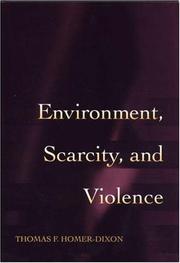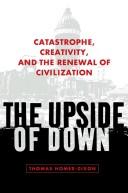| Listing 1 - 10 of 10 |
Sort by
|

ISBN: 0691027943 0691089795 1282457845 1400822998 9786612457845 1400812100 9781400812103 9781400822997 9780230118966 0230118968 9780691027944 9780691089799 Year: 1999 Publisher: Princeton, N.J.
Abstract | Keywords | Export | Availability | Bookmark
 Loading...
Loading...Choose an application
- Reference Manager
- EndNote
- RefWorks (Direct export to RefWorks)
The Earth's human population is expected to pass eight billion by the year 2025, while rapid growth in the global economy will spur ever increasing demands for natural resources. The world will consequently face growing scarcities of such vital renewable resources as cropland, fresh water, and forests. Thomas Homer-Dixon argues in this sobering book that these environmental scarcities will have profound social consequences--contributing to insurrections, ethnic clashes, urban unrest, and other forms of civil violence, especially in the developing world. Homer-Dixon synthesizes work from a wide range of international research projects to develop a detailed model of the sources of environmental scarcity. He refers to water shortages in China, population growth in sub-Saharan Africa, and land distribution in Mexico, for example, to show that scarcities stem from the degradation and depletion of renewable resources, the increased demand for these resources, and/or their unequal distribution. He shows that these scarcities can lead to deepened poverty, large-scale migrations, sharpened social cleavages, and weakened institutions. And he describes the kinds of violence that can result from these social effects, arguing that conflicts in Chiapas, Mexico and ongoing turmoil in many African and Asian countries, for instance, are already partly a consequence of scarcity. Homer-Dixon is careful to point out that the effects of environmental scarcity are indirect and act in combination with other social, political, and economic stresses. He also acknowledges that human ingenuity can reduce the likelihood of conflict, particularly in countries with efficient markets, capable states, and an educated populace. But he argues that the violent consequences of scarcity should not be underestimated--especially when about half the world's population depends directly on local renewables for their day-to-day well-being. In the next decades, he writes, growing scarcities will affect billions of people with unprecedented severity and at an unparalleled scale and pace. Clearly written and forcefully argued, this book will become the standard work on the complex relationship between environmental scarcities and human violence.
Violence --- Social conflict --- Renewable natural resources --- Scarcity --- Conflits sociaux --- Ressources renouvelables --- Rareté (Economie politique) --- Environmental aspects --- Social aspects. --- Aspect de l'environnement --- Aspect social --- 838.1 Ecologie --- 835 Natuurlijke rijkdommen --- #SBIB:327.5H21 --- #SBIB:327.4H60 --- #SBIB:324H73 --- Vrede – oorlog, oorlogssituaties --- Derde wereld: ontwikkeling, sociale verandering: algemeen --- Politieke verandering: oppositie en minderheid, protest, politiek geweld --- Environmental degradation --- Social aspects --- Developing countries --- Environmental conditions. --- Rareté (Economie politique) --- Deficiency --- Shortages --- Natural resources, Renewable --- Renewable resources --- Resources, Renewable natural --- Degradation, Environmental --- Destruction, Environmental --- Deterioration, Environmental --- Environmental destruction --- Environmental deterioration --- Class conflict --- Class struggle --- Conflict, Social --- Social tensions --- Violent behavior --- Economic aspects --- Emerging nations --- Fourth World --- Global South --- LDC's --- Least developed countries --- Less developed countries --- Newly industrialized countries --- Newly industrializing countries --- NICs (Newly industrialized countries) --- Third World --- Underdeveloped areas --- Underdeveloped countries --- Natural resources --- Natural disasters --- Environmental quality --- Interpersonal conflict --- Social psychology --- Sociology

ISBN: 9781597260657 9781597260640 Year: 2006 Publisher: Washington, DC : Island Press/Shearwater Books,
Abstract | Keywords | Export | Availability | Bookmark
 Loading...
Loading...Choose an application
- Reference Manager
- EndNote
- RefWorks (Direct export to RefWorks)
Sustainable development. --- Environmental policy. --- Développement durable --- Environnement --- Politique gouvernementale --- Environmental policy --- Sustainable development --- duurzame ontwikkeling --- milieuvraagstukken --- S20090369.JPG --- 504 --- Environment and state --- Environmental control --- Environmental management --- Environmental protection --- Environmental quality --- State and environment --- Environmental auditing --- Development, Sustainable --- Ecologically sustainable development --- Economic development, Sustainable --- Economic sustainability --- ESD (Ecologically sustainable development) --- Smart growth --- Sustainable economic development --- Economic development --- Government policy --- Environmental aspects

ISBN: 0099286289 Year: 2001 Publisher: London : Vintage,
Abstract | Keywords | Export | Availability | Bookmark
 Loading...
Loading...Choose an application
- Reference Manager
- EndNote
- RefWorks (Direct export to RefWorks)
Book
ISBN: 2871080321 Year: 1994 Publisher: Liège : IUSSP,
Abstract | Keywords | Export | Availability | Bookmark
 Loading...
Loading...Choose an application
- Reference Manager
- EndNote
- RefWorks (Direct export to RefWorks)
Book
ISBN: 0285637940 Year: 2006 Publisher: London : Souvenir press,
Abstract | Keywords | Export | Availability | Bookmark
 Loading...
Loading...Choose an application
- Reference Manager
- EndNote
- RefWorks (Direct export to RefWorks)
Book
ISBN: 0871241528 Year: 1993 Publisher: New York (N.Y.): Foreign policy association
Abstract | Keywords | Export | Availability | Bookmark
 Loading...
Loading...Choose an application
- Reference Manager
- EndNote
- RefWorks (Direct export to RefWorks)
Environmental policy --- Environmental responsibility --- Sustainable development

ISBN: 0224050532 Year: 2000 Publisher: London Cape
Abstract | Keywords | Export | Availability | Bookmark
 Loading...
Loading...Choose an application
- Reference Manager
- EndNote
- RefWorks (Direct export to RefWorks)
Digital
ISBN: 9781400822997 9780691089799 Year: 2010 Publisher: Princeton, N.J. Princeton University Press
Abstract | Keywords | Export | Availability | Bookmark
 Loading...
Loading...Choose an application
- Reference Manager
- EndNote
- RefWorks (Direct export to RefWorks)
Book
Year: 1995 Publisher: Brussels US information service
Abstract | Keywords | Export | Availability | Bookmark
 Loading...
Loading...Choose an application
- Reference Manager
- EndNote
- RefWorks (Direct export to RefWorks)
Book
Year: 1995 Publisher: Washington D.C. United States Information Agency
Abstract | Keywords | Export | Availability | Bookmark
 Loading...
Loading...Choose an application
- Reference Manager
- EndNote
- RefWorks (Direct export to RefWorks)
| Listing 1 - 10 of 10 |
Sort by
|

 Search
Search Feedback
Feedback About UniCat
About UniCat  Help
Help News
News